Welcome back to This Week in Apps, the Extra Crunch series that recaps the latest OS news, the applications they support and the money that flows through it all.
The app industry saw a record 204 billion downloads and $120 billion in consumer spending in 2019, according to App Annie’s “State of Mobile” annual report. People are now spending 3 hours and 40 minutes per day using apps, rivaling TV. Apps aren’t just a way to pass idle hours — they’re a big business. In 2019, mobile-first companies had a combined $544 billion valuation, 6.5x higher than those without a mobile focus.
In this Extra Crunch series, we help you keep up with the latest news from the world of apps, delivered on a weekly basis.
This week, we’re continuing our special coverage of how the COVID-19 outbreak is impacting apps and the wider mobile app industry as more COVID-19 apps appear — including one from Apple built in partnership with the CDC, among others. We also take a look at the gains made by social and video apps in recent weeks as people struggle to stay connected while stuck at home in quarantine. In other headlines, we dig into Instagram’s co-watching feature, the Google for Games conference news, Apple’s latest releases and updates, Epic Games expansion into publishing and more.
Coronavirus Special Coverage
Social video apps are exploding due to the COVID-19 pandemic
People looking to stay connected during in-home quarantines have turned to video chat apps in record numbers, with work conferencing app Zoom leading the pack, according to new research from Apptopia. Some highlights:
- Zoom installs are up from 171,574 on February 15 to 2.4 million on March 25
- Houseparty (from Epic Games) installs are up from 24,795 on February 15 to 651,694 on March 25
- Discord installs are up from 219,585 on February 15 to 443,480 on March 25
- Marco Polo installs are up from 12,674 downloads on February 15 to 73,395 on March 25
Hoping to join the party, Google Duo this week increased its group calling limit to 12 participants (from eight).
Facebook apps see record usage amid pandemic
New insights from Kantar indicate a boom in Facebook’s suite of apps as people look to network with friends and family while stuck in their homes. WhatsApp has seen a 40% increase in usage and Facebook usage increased by 37%, the study found.
Facebook also released its own data, saying that total messaging on its platform was up by more than 50% over last month. Time across all apps since the crisis had grown 70% and time in group calls (three or more participants) was up by more than 1,000% during the last month, it added.
TikTok sees global download boom
TikTok saw 84.8 million global downloads from March 1-23, up 5% from the same period in February, according to Sensor Tower (via Music Business Worldwide). The U.S. accounted for 6.2 million of those, up 27% from February. TikTok still struggles with revenue, however. Despite a massive install base, revenue was just $46.4 million, up 10% from $42 million in February.
However, the wider network of TikTok add-on apps are taking off. Nearly 38% of the 480 million installs from 2019’s top 20 new apps were sidekick apps to aid TikTok and Instagram users. TikTok owner ByteDance was behind the No. 3 app, Jianying Vlog, in fact.
Apple adds COVID-19 PSA to UK App Store
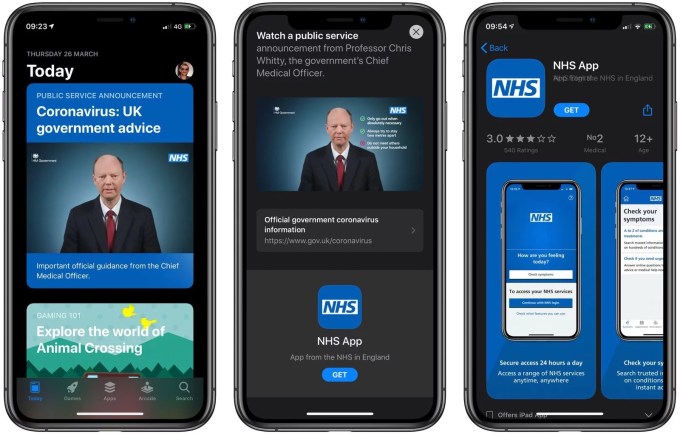
In an unprecedented move, Apple added U.K. government advice about the coronavirus outbreak to its App Store app. In a special section titled “Public Service Announcement,” Apple directly links to guidance from the U.K.’s Chief Medical Officer, Professor Chris Whitty. The link takes users to the NHS app and a video message from Whitty (via MacRumors).
Top apps add coronavirus information hubs
Hoping to leverage the world’s biggest applications to get critical health news to a wider network of users, a number of mobile apps introduced coronavirus information services and hubs. A few notable launches include:
- U.K. government adds a coronavirus information service on WhatsApp, plus the above-mentioned App Store PSA.
- India launches a WhatsApp chatbot to raise awareness about the coronavirus pandemic and get answers about the viral disease.
- Facebook’s Messenger adds a community hub to fight coronavirus rumors.
- The Weather Channel app adds new tools to bring COVID-19 mapping to more people.
- Snapchat-owned Zenly adds a shelter-in-place leaderboard to gamify safety measures as well as other tips to help stop the spread of the virus.
Coronavirus apps in the spotlight
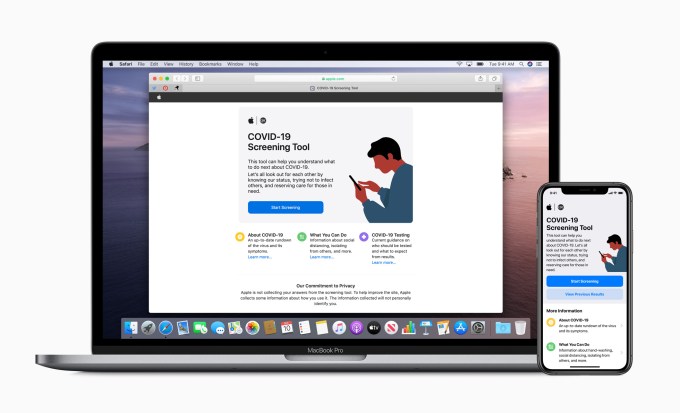
- Apple launched a COVID-19 app as both a website and mobile app in partnership with the CDC, the White House and FEMA. The new tool helps U.S. users learn about COVID-19 and its symptoms, take protective measures and offers guidance about COVID-19 testing. The launch follows that of Verily’s COVID-19 screening site, praised by Trump as developed by Google. (Verily is an Alphabet company; Alphabet became parent to Google and others after Google’s restructuring.)
- The Singapore government will make available to developers worldwide the source code for its contact-tracking app TraceTogether, which has been installed by more than 620,000 people.
Headlines
Instagram adds co-watching feature
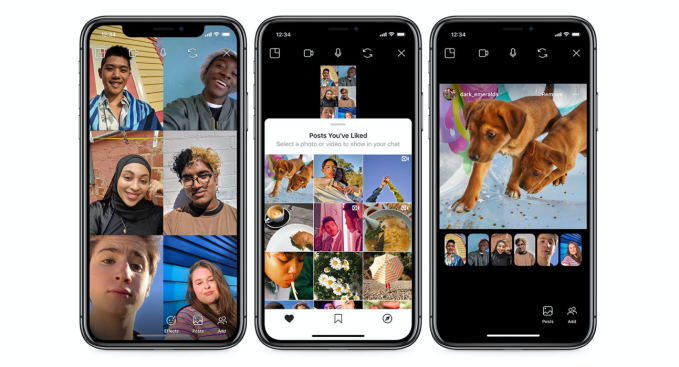
Friends can now browse Instagram together while on a group video call through Instagram’s new co-watching feature. The addition, which has been in testing for at least a year, is designed to give people a reason to stay in the app for longer periods and boost ad views. It also gives Instagram a way to compete with top video chat apps like Houseparty, which is dominating the charts during the COVID-19 quarantine and already offers screen-sharing. (Houseparty is No. 3 while Instagram slipped to No. 9 on the App Store as of Friday).
The new feature will likely be a welcome addition among Instagram’s younger users, in particular, as they’re stuck right now, bored and missing their real-world togetherness.
U.S. users spent an average of $100 on apps in 2019, up 27% year-over-year
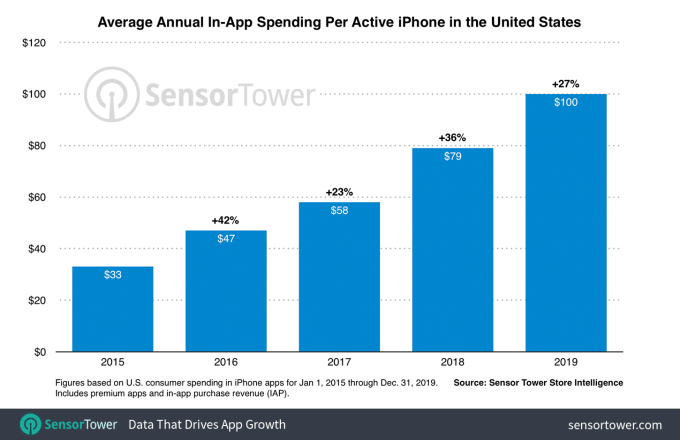
According to new Sensor Tower data, the average amount spent on in-app purchases and premium apps reached $100 for the first time in 2019, up from $79 in 2018 and up from just $33 in 2015. Mobile games continue to dominate in-app spending, accounting for $53.80, up from $44 in 2018.
Other apps leveraging subscriptions also did well, including YouTube, PicsArt, Tinder and Calm. In 2019, the top 100 subscription apps brought in $3.6 billion in the U.S. App Store.
Fortnite maker Epic Games launches publishing label
Fortnite’s maker is getting into publishing.
The company this week announced it’s “building the publishing model we always wanted for ourselves when we worked with publishers.” Development partners include Remedy Entertainment (Control), Playdead (Limbo, Inside), and Gen Design (The Last Guardian). The label promises developer-friendly terms for its multi-platform publishing program, including developers’ ability to keep 100% of all IP and full control of their work.
Epic Games Publishing will also cover up to 100% of development costs, including QA, localization, marketing and publishing. Once costs are recouped, developers earn at least 50% of profits.
Anti-competitive App Store rules limit cloud gaming services
Apple came under fire this week for its anti-competitive — or at least, outdated — App Store rules around streaming game services, in a report from Bloomberg.
Currently, its guidelines ban gaming services that stream from the cloud. Instead, Apple requires each game to be submitted individually and approved. This allows individual games to be ranked and searched. This limits from competing on the App Store new gaming services like Google’s Stadia, Microsoft’s xCloud and Nvidia’s GeForce Now. Today, only one gaming service exists on the App Store: GameClub. The app offers a subscription to old-school mobile games, each published under the developer’s account.
Disney+ sees 5M downloads on day one of its European launch
Streaming service launched on March 24th in Europe, starting with Austria, Germany, Ireland, Italy, Spain, Switzerland and the U.K.. The app likely benefited from the fact that many European users are now on lockdown at home and have children in need of entertainment. App Annie estimates the app saw 5 million downloads on launch day, and is now poised to become one of the region’s top streaming apps.
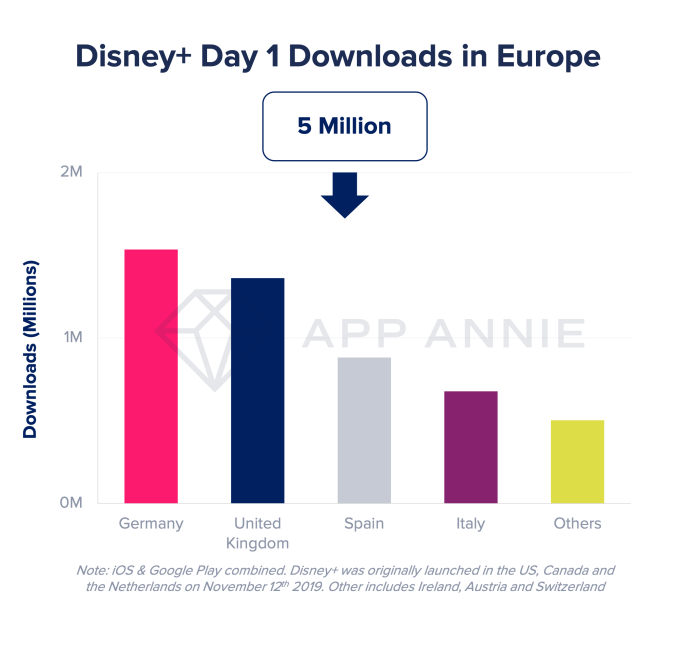
The app will hit France in two weeks and other Western European markets in summer 2020, followed by Latin America and Asia-Pacific rollouts. So far, Disney+ is the No. 7 app by consumer spend worldwide, excluding games — impressive for an app launched in the U.S. in November 2019 and one that’s only been live in five markets until now. The app’s success is more critical than ever to Disney’s business as the impacts of the coronavirus have forced parks to close and may keep visitors away even once re-opened.
Android malware found in Play Store
Despite Google’s recent partnerships with security firms to scan its Play Store for malicious apps, over 50 malware-laden apps were recently found in the Play Store. The 56 total apps had nearly a million combined downloads and were used to commit ad fraud. The malware, named “Tekya,” was able to go undetected because it hid in Android’s native code. That kept it hidden from Android’s protection system, Google Play Protect.
Robinhood claims it has fixed its problems
Trading app Robinhood claims it has fixed the engineering flaws that led to multiple outages this month as the stock market leapt and crashed. The problems led to Robinhood users being left out of the biggest-ever one-day point gain in Dow Jones history. Now the company claims it has fixed the underlying engineering problems and strengthened its infrastructure. It’s also trying to do right by customers by offering credits. Despite the issues, Robinhood claims trading volume in March was 3x that of Q4 and it saw a 10x increase in net deposits.
More iOS 14 Leaks
More leaks from iOS 14 code snippets point to BMW being the first to use Apple’s CarKey API for NFC-based keyless entry to its vehicles. Another iOS 14 leak points to new “Find My” features that include notification triggers and an AR mode. The latter would allow users to locate items visually using AR for more precise directions to the lost item.
Spotify ends support for DJ apps
Spotify has made the decision to cut off third-party DJ apps from its library. Algoriddim announced the news on its website, noting that as of July 1, 2020, Spotify will no longer be playable through third-party DJ apps, including Algoriddim’s own app, djay. The company is now offering to migrate users to TIDAL or Soundcloud as a result.
Google for Games event brings new tools and features for Android, Play & Firebase

Google’s event went online due to the coronavirus outbreak, but Google still had a lot of news:
- Google Play Asset Delivery: Google introduces a new way to dynamically deliver developers’ games, giving game players the ability to more quickly get into game sessions while assets are being loaded.
- Android Performance Tuner: Through a new library in the Android Game SDK developer preview, developers can optimize their frame rate and fidelity across many devices at scale with new performance insights in Android vitals.
- Android GPU Inspector: A tool that allows developers to look deeply into Android GPUs and see more details on how their games render stages and GPU counters. This gives graphics engineers more information and insights to work with when optimizing their games for better frame rates and battery life. This is being developed in partnership with Qualcomm.
- Firebase updates: Firebase introduced Cloud Firestore for game developers in open alpha, giving game developers access to multi-region reliability (for up to five 9s of uptime), and new compatibility for their Unity SDKs with the Unity package manager.
- Scaled user testing: Soon, developers will be able to promote Android games with open testing in Google Ads.
- App + Web properties in Google Analytics: These will now proactively surface gaming-specific user funnel metrics like acquisition, retention, engagement and monetization in one place.
- Earn more from a game: Google introduced a new tool called Mediation A/B testing, so developers can test and refine ads monetization setups directly in your AdMob account.
Perhaps the most interesting is the new asset delivery system, which adds more granular control over the components delivered than the earlier App Bundles system.
Google really cancels I/O
Google first said it was canceling its Google I/O Live Event. But toward the end of last week, it decided to call the whole thing off. The virtual version of the I/O event is now canceled as well, given the shelter-in-place orders across the state of California, which would impact Google’s ability to live stream the event as it would require production staff and presenters to gather in groups, in violation of stay-at-home orders.
Apple updates
- App Store expands to more countries. Apple announced its App Store this year to 20 more countries. Interested developers need to follow a few steps to make their apps automatically available to the new markets in App Store Connect. To date, the App Store has helped generate more than $155 billion in developer earnings across 155 countries and regions.
- Apple readies its Apple Developer app ahead of its first-ever virtual WWDC. The new version lets you watch videos at multiple playback speeds, interact with the full video transcripts, and share stories from the Discover tab.
- In light of the COVID-19 outbreak, Apple extended the deadline for adhering to its new policies, including SDK usage, adoption of Sign in with Apple and updated App Store Guidelines. While the company doesn’t name the outbreak in its announcement, it does acknowledge that developers may need more time. The new deadline is June 30, 2020.
- Apple releases iOS and iPadOS 13.4. The update includes the ability to pair a mouse or trackpad with an iPad, introduced with the new iPad Pro last week. But you don’t need a new iPad to use the feature. Other updates include iCloud Folder Sharing, nine new Memoji stickers, support for universal apps across iOS and Mac, Screen Time Communication Limits on Mac and more.
- Apple releases ARKit 3.5. The new release allows developers to take advantage of the new LiDAR Scanner in the new iPad Pro. The release also includes Scene Geometry, Instant AR and improved Motion Capture and People Occlusion.
- An unpatched bug in iOS 13.3.1 could prevent VPNs from fully encrypting all traffic at a time when a significant number of people are working from home, connecting to work VPNs, as the COVID-19 outbreak spreads. Apple is aware of the problem and working to mitigate it. It recommends enabling Always-on VPN, if possible.
Fundings and M&A
- Huge merger between two top mobile marketplaces apps OfferUp and letgo. OfferUp raised $120 million from letgo investor OLX Group and will acquire letgo. The apps will remain separate for now, but may share listings and other services, like shipping, going forward.
- Cross-platform streamer fuboTV merges with virtual entertainment company FaceBank in what was probably a life-saving move.
- The New York Times Company acquired Audm, an app that turns long-form journalism into audio.
Recommended reading (and listening!)
- Hipster Whale CEO talks Apple Arcade, Crossy Road Castle and industry challenges: CNET interviews Hipster Whale’s CEO Clara Reeves about being a woman in gaming, and the positivity and escapism offered by new title, Crossy Road Castle.
- Review: 100,000 miles and one week with an iPad Pro: TechCrunch editor Matthew Panzarino travels and works from the iPad Pro during the past 18 months of travels. This in-depth review digs into the challenges and trade-offs of using the iPad instead of a Mac, but ultimately, the iPad wins. “There is no way, today, that I would choose to go back to a laptop given my style of work,” Panzarino says.
- Ep. 69 “Swift Playgrounds” of Swift by Sundell: 9to5Mac spotted the first-ever interview with Apple software engineers Holly Borla and Grace Kendall. The interview goes on a deep dive of Swift Playgrounds, Swift 5.2’s new diagnostics engine, Swift Playgrounds role in education, and how Swift Playgrounds was ported to Mac using Catalyst.
Downloads
CatchUp
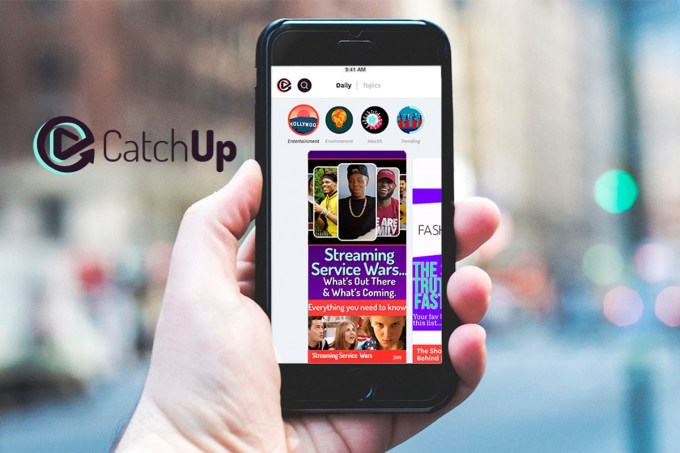
Mammoth Media debuts CatchUp, an app that summarizes news and other trending content, including podcasts and Netflix shows.
Watchworthy
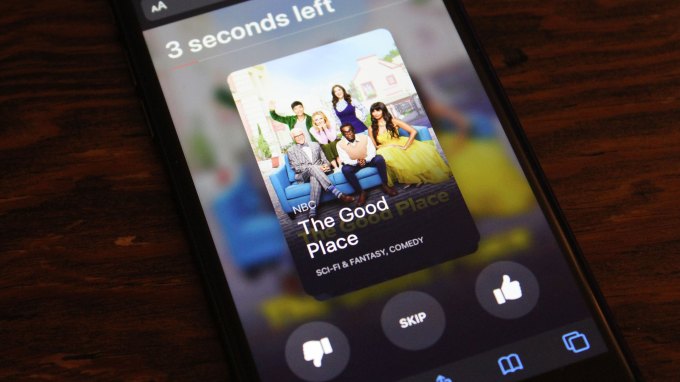
Ranker launched Watchworthy, a new app that helps users find something new to watch across TV networks and more than 200 streaming services like Netflix, Hulu, Prime Video, Apple TV+ and many more. The app is powered by Ranker’s extensive crowdsourced ranking data, which makes its suggestions pretty good.
Duolingo ABC
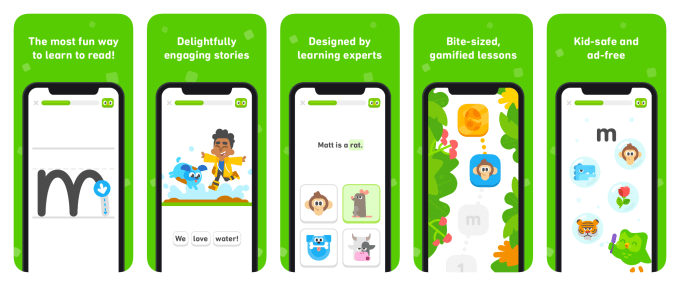
With so many parents stuck at home running homeschools, language-learning company Duolingo moved up the launch of Duolingo ABC. This free English literacy app is aimed at children ages 3 to 6 and includes more than 300 short lessons in reading and writing.


